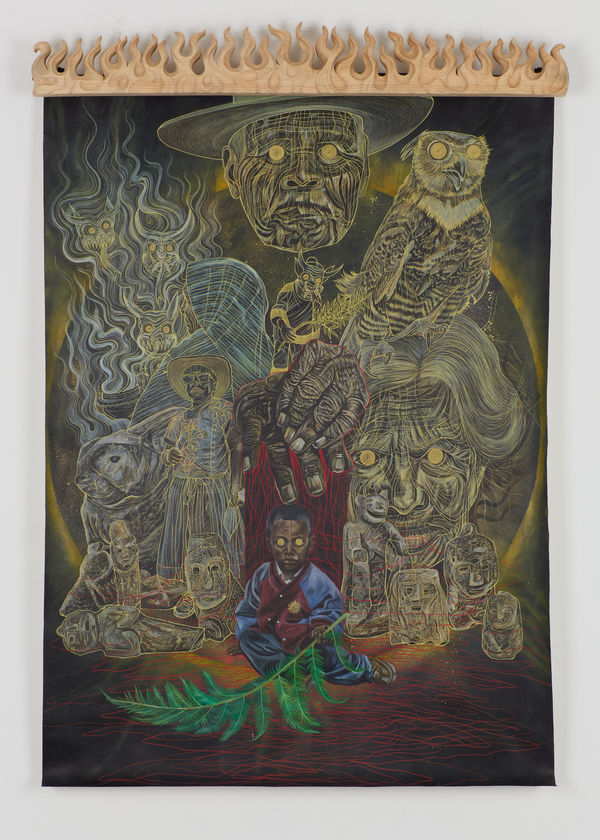Giovanni Fabián Guerrero Mexico, b. 1993
Guerrero's work draws on his P'urhépecha roots and the daily life and history of his community in Cherán, Michoacán, in particular the remarkable journey of the community-town towards self-governance and the people's spiritual connection to the forest.
In 2011, after years of cartel violence, systemic corruption and persistent logging of the forest, the communal citizens of Cherán launched a campaign to initiate a resistance movement. Galvanized by local women, the protests succeeded not only in driving out the cartel and those destroying the forest, but in establishing the origins of the town's self-government that have since resulted in Cherán's legal autonomy and one of the lowest rates of violence in Mexico. Following the liberation of its people, the community underwent a period of re-discovery that rooted its future in current Indigenous ways of governance and in a reciprocal relationship with the more than human.
Inspired by Mexican Muralism and the history of the mural as a political springboard, Guererro helped form the Colectivo Cherani, an inter-generational collective of artists using the mural as well as graffiti, installation, performance and painting to honour and continue the traditions and customs of Cherán.
Whether working independently or as part of the collective, Guerrero's practice is grounded in the principles that underpin a healthy community and pre-Colonial wisdom. His paintings are often kaleidoscopic panoramas with an expansive, mystical sense of place and a pulsating, cosmic energy. Community elders, family forebearers, Sikuames (witches) and Xurhiskis (healers of the body and spirit) merge with spirits of the forest, birds and animals in densely layered narratives that appear to speak in many voices and across time. These works are often displayed alongside masks constructed from branches and leaves from the forest and wasp honeycomb, bringing the demons of the forest into physical form and reminding us all of their power.
Notable group shows and exhibition include Hammer Projects: Colectivo Cherani, Hammer Museum, Los Ángeles, California, USA; Máhcaheapmi (Responses)#1: Practices of Sovereignty. Art and Resistance in the Sámi and P'urehpecha Nations. A collaboration between Museo Universitario Arte Contemporáneo, Mexico City, Mexico and the Office for Contemporary Art, Oslo, Norway; Reinventar América, Museo Franz Mayer, México City, Mexico andJurhiata sesí janturhu, Cuenca Biennial, Cuenca, Ecuador.
His work has been acquired by Pérez Art Museum Miami, USA; Denver Art Museum, USA; National Museum of Anthropology and History, Mexico City, Mexico; University Museum of Contemporary Art, Mexico City, Mexico; The Family Servais Collection, Brussels, Belgium; Zarur Collection, Guadalajara, Mexico and the Alumnos 47 Foundation, Mexico City, Mexico among others.
-
 Cosmos, territorios de comunidad 3 (Cosmos, community territories 3), 2025
Cosmos, territorios de comunidad 3 (Cosmos, community territories 3), 2025 -
 Cosmos, territorios de comunidad 4 (Cosmos, community territories 4), 2025
Cosmos, territorios de comunidad 4 (Cosmos, community territories 4), 2025 -
 Cosmos, territorios de comunidad 5 (Cosmos, community territories 5), 2025
Cosmos, territorios de comunidad 5 (Cosmos, community territories 5), 2025 -
 De la serie buscar la lluvia “amarre” (From the series Seeking Rain: Mooring), 2025
De la serie buscar la lluvia “amarre” (From the series Seeking Rain: Mooring), 2025 -
 De la serie Buscar la lluvia. Perder la sombra” (From the series Seeking Rain. To lose one's shadow), 2025
De la serie Buscar la lluvia. Perder la sombra” (From the series Seeking Rain. To lose one's shadow), 2025 -
 Sombras que habitan la barranca (Shadows that inhabit the ravine), 2025
Sombras que habitan la barranca (Shadows that inhabit the ravine), 2025 -
 ¡No pasaran!, 2023
¡No pasaran!, 2023 -
 Ritual de curacion por el bosque talado, 2022
Ritual de curacion por el bosque talado, 2022









